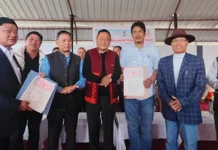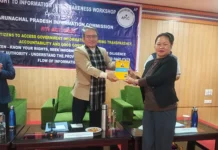Staff Reporter
ITANAGAR, 21 Jul: Taking sou moto cognisance, the Gauhati High Court has set the bail hearing of Yumken Bagra – accused of raping multiple minors – on 27 July, and came down heavily on the special court judge who granted bail to Bagra.
Bagra is out on bail since 23 February.
The Court took registered suo moto cancellation of bail application on the basis of the news articles published in Purvanchal Prahari and The Arunachal Times, regarding grant of bail to Bagra.
He was a warden of the government residential school in Karo village in Monigong circle of Shi-Yomi district. He allegedly raped 21 children (15 girls and 6 boys), aged 6 to 12 years, between 2019 and 2022.
He has been booked under the Protection of Children from Sexual Offences (POCSO) Act, and under Sections 6, 8, 10, 12, and 376 A, B and C of the Indian Penal Code in connection with Monigong Police Station Case No 2/2023, registered for offences under Sections 10/12/14/(1)/15(1)/2 of the POCSO Act, 2012.
Initiating the bail cancellation process, the high court chief justice Sandeep Mehta came down heavily on the special court judge for granting bail to the accused.
“The special court, without giving due consideration to these substantial objections of the learned special public prosecutor, Arunachal Pradesh, granted bail to the accused in a casual manner, despite observing that the statements of the victims reveal a grave offence having been committed, but the trial was yet to begin due to non-appearance of the co-accused, Daniel Pertin,” the chief justice stated.
The chief justice further observed: “Absolutely flimsy reasons were assigned by the special court for granting bail to the accused, who, being the hostel warden, was entrusted the duty of ensuring the safety of the children lodged in the hostel acted in a demonic manner and sexually assaulted the young children over a period of almost three years and exposed them to pornographic material. The trial of an accused chargesheeted for such serious offences need not wait for the apprehension of the absconding accused and proceedings can even be continued by separating the trials.”
The SIT chargesheet revealed that the accused warden had forced the children staying as boarders in the hostel to watch pornographic movies and repeatedly subjected them to sexual assaults.
The CJ said that “the conscience of the court has been shaken by the way in which a case of such grave magnitude and sensitive nature has been dealt with in a cavalier fashion by granting bail to the main accused without assigning any plausible reasons. The larger issue which bothers the mind of the court is regarding safety of the victims of the ghastly act of sexual assault after the release of the accused on bail.”
The high court also observed that “there is an emergent need of sensitising the special judges posted in the POCSO court across the state, considering the tenor of the order passed the special judge by granting bail to multiple minor’s rape accused. It is pertinent to mention that the district child protection units have been imparting training on the POCSO Act, 2012 and the Juvenile Justice (Care and Protection of Children) Act, 2015 to the police and legal counsels.”
“Considering the tenor of the order passed by the learned Special Judge, this Court feels that there is a emergent need of sensitizing the Special Judges posted in the POCSO Courts across the States of Arunachal Pradesh, Nagaland, Mizoram and Assam”, the judgement read with a direction that the Director, Judicial Academy, Assam shall forthwith initiate the process for training and sensitizing of all Judicial Officers dealing with POCSO Act cases in Assam, Nagaland, Mizoram and Arunachal Pradesh.
It further directed the advocate general to ensure that “intimation of the bail cancellation proceedings be provided to the family members of the victims and, in case any of them is desirous of being heard, appropriate facilities and free legal aid shall be provided to them to address the court through VC from the Itanagar permanent bench of the Gauhati High Court.”




